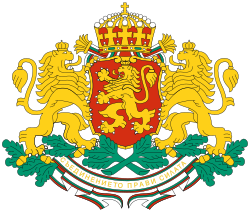History
Yugoslavia
| Number and percentage of the Bulgarian ethnic minority in Macedonia from 1948-2021 [4] [5] [6] | ||||||||||||||||||
|---|---|---|---|---|---|---|---|---|---|---|---|---|---|---|---|---|---|---|
| Ethnic group | census 1948 | census 1953 | census 1961 | census 1971 | census 1981 | census 1991 | census 1994 | census 2002 | census 2021 | |||||||||
| Number | % | Number | % | Number | % | Number | % | Number | % | Number | % | Number | % | Number | % | Number | % | |
| Bulgarians | 889 | 0.1 | 920 | 0.1 | 3,087 | 0.2 | 3,334 | 0.2 | 1,984 | 0.1 | 1,370 | 0.1 | 1,682 | 0.1 | 1,417 | 0.1 | 3,504 | 0.2 |
Until the Balkan Wars the majority of the Slav population of all three parts of the wider region of Macedonia had Bulgarian identity. [7] In 1913, the region of present-day Republic of North Macedonia became a part of the Kingdom of Serbia, thus becoming Southern Serbia . During World War I and World War II, when most regions of Macedonia were annexed by Bulgaria, a pro-Bulgarian sentiment still existed among the Slavic majority. [8] [9] However, harsh treatment by occupying Bulgarian troops reduced significantly the pro-Bulgarian orientation of the Macedonian Slavs. [10] After the end of World War II, the creation of People's Republic of Macedonia and the codification of a new Macedonian language, a process of ethnogenesis started and a distinct national Macedonian identity was inaugurated into an established system. The new Yugoslav authorities began a policy of removing of any Bulgarian influence, making North Macedonia a connecting link for the establishment of new Balkan Communist Federation and creating a distinct Slavic consciousness that would inspire identification with Yugoslavia. [11] The authorities took also repressive measures that would overcome the Bulgarian national identity of the population, such as the Bloody Christmas in 1945. [12] [13] In North Macedonia the Bulgarophobia increased almost to the level of state ideology, [14] and the communists were successful in removing all Bulgarian influence in the region. [12] A special Law for the Protection of Macedonian National Honour was passed by the government of the SR Macedonia at the end of 1944. The Presidium of Anti-fascist Assembly for the National Liberation of Macedonia established a special court for the implementation of this law, which came into effect on January 3, 1945. [15] [16] [17] [18] Bulgarian sources claim that in early 1945, around 100,000 Bulgarophiles were imprisoned and over 1,260 were allegedly killed due to this Law. [19] [20] In the period between 1945 and 1991, when North Macedonia was part of Yugoslavia, there was also migration of Bulgarian population from SR Serbia to the SR Macedonia. [21] The number of these migrants is unofficially estimated at 20,000. [22]
| Part of a series on |
| Bulgarians Българи |
|---|
 |
| Culture |
| By country |
| Subgroups |
| Religion |
| Language |
| Other |
The Fall of Communism to Present-Day
By the time the then-Republic of Macedonia proclaimed its independence those who continued to look to Bulgaria were very few. [12] Some 3,000 - 4,000 people that stuck to their Bulgarian identity (most from Strumica and surroundings) met great hostility among the authorities and the rest of the population. With the fall of Communism the hostility decreased, but still remains. [12] Occasional trials against Bulgarophiles have continued until today. [23] [24] In the period after 1991 ca. 100,000 citizens of North Macedonia have acquired Bulgarian citizenship (which represents 10% of the self-declared ethnic Macedonians in the country in the 2021 population census), almost all of them acquired by descent and always on 1st position by acquired citizenship per country. On 11 December 2020 at the Parliament, the Minister of Justice of Bulgaria Desislava Ahladova reported that from 1 January 2010 to 22 October 2020, 77,829 files have been opened for the acquisition of Bulgarian citizenship by citizens of North Macedonia, 77,762 of them based on declared Bulgarian origin. [2] Macedonian citizens are starting to take out Bulgarian passports due to the fact that Bulgaria is becoming a member of the European Union, and with that, the only prospect for Macedonian citizens is to be able to work and live in European countries where there are greater conditions for prosperity.
| Year | Period | Acquired citizenships | Position |
|---|---|---|---|
| 2002-2012 [25] | 22.01.2002-15.01.2012 | 44,211 | 1 |
| 2012 [26] | 23.01.2012-22.01.2013 | 8,185 | 1 |
| 2013 [27] | 23.01.2013-22.01.2014 | 4,388 | 1 |
| 2014 [28] | 01.01.2014-31.12.2014 | 1,874 | 1 |
| 2015 [29] | 01.01.2015-31.12.2015 | 4,315 | 1 |
| 2016 [30] | 01.01.2016-31.12.2016 | 6,196 | 1 |
| 2017 [31] | 14.01.2017-31.12.2017 | 1,150 | 1 |
| 2018 [32] | 01.01.2018-31.12.2018 | 3,619 | 1 |
| 2019 [33] | 01.01.2019-31.12.2019 | 5,628 | 1 |
| 2020 [34] | 01.01.2020-31.12.2020 | 9,098 | 1 |
| 2021 [35] | 01.01.2021-31.12.2021 | 7,696 | 1 |
| 2022 [36] | 01.01.2022-31.12.2022 | 1,992 | 1 |
| 2023 [37] | 01.01.2023-31.12.2023 | 2,422 | 1 |
| 2024 [38] | 01.01.2024-31.12.2024 | 1,698 | 4 |
| Total | 22.01.2002-22.01.2024 | 102,472 | 1 |
There were 37 ethnic Bulgarians born in North Macedonia who lived in the United States of America in 2015. [39]
In 2021, Bulgarian President Rumen Radev claimed that some 120,000 Macedonian citizens held Bulgarian passports and insisted on putting them into North Macedonia's constitution, which lists the Albanian, Serbian, Bosniak, Turkish, Romani peoples, as well as the other peoples inhabiting the country. [40] [41] A total of 169 people in North Macedonia voted in the 2023 Bulgarian parliamentary election. [42]
